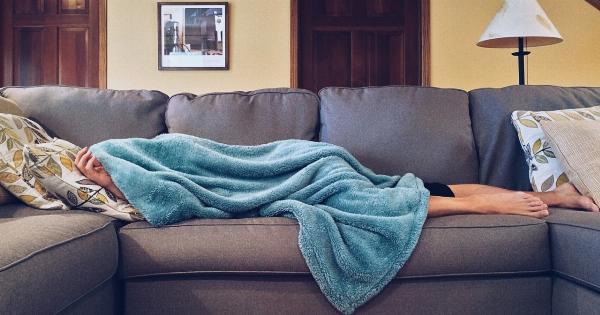Do you ever sleep on the couch instead of your bed? Maybe you fall asleep watching TV and just don’t feel like moving, or maybe you find the couch more comfortable.
Whatever the reason, sleeping on the couch every night can have negative effects on your health and well-being.
1. Back Pain
Sleeping on the couch can lead to back pain due to lack of support. Couches are not designed to provide proper spinal alignment and can cause strain on the lower back.
Over time, this can lead to chronic pain and discomfort, making it harder to sleep comfortably in any position.
2. Poor Sleep Quality
Even if you feel comfortable on the couch, chances are your sleep quality is suffering. Couches are generally not as comfortable as beds, and the lack of proper support can lead to tossing and turning throughout the night.
This can result in poor sleep quality and lead to daytime fatigue, irritability, and difficulty concentrating.
3. Increased Risk of Sleep Apnea
Sleeping on the couch can increase your risk of developing sleep apnea, a condition where breathing temporarily stops during sleep.
This is due to the fact that sleeping on your back can cause the tongue and soft tissues in the mouth to collapse and block the airway. This is more likely to occur on a couch, as you are more likely to sleep on your back due to limited space and lack of support.
4. Poor Circulation
Sleeping on a couch can also lead to poor circulation, especially in the legs. This is due to the fact that the body is not properly elevated, which can cause blood to pool in the legs.
Over time, this can lead to increased risk of varicose veins, blood clots, and other circulation-related issues.
5. Increased Stress
Sleeping on the couch every night can lead to increased stress levels. This is due to the fact that the couch is associated with leisure time and relaxation, rather than restorative sleep.
This can lead to a lack of separation between work and home life, which can lead to increased stress and difficulty relaxing at night.
6. Relationship Strain
Finally, sleeping on the couch can also lead to strain in relationships. Whether it is due to snoring, discomfort, or just feeling left out, sleeping separately can lead to decreased intimacy and increased feelings of isolation.
Over time, this can lead to strain in even the strongest of relationships.
Conclusion
Sleeping on the couch every night may seem like a harmless habit, but it can have negative effects on your health and well-being. From back pain to poor sleep quality, sleeping on the couch can increase your risk of a variety of health issues.
If you find yourself sleeping on the couch every night, it may be time to invest in a comfortable mattress and make your bed a priority. Your body will thank you.






























